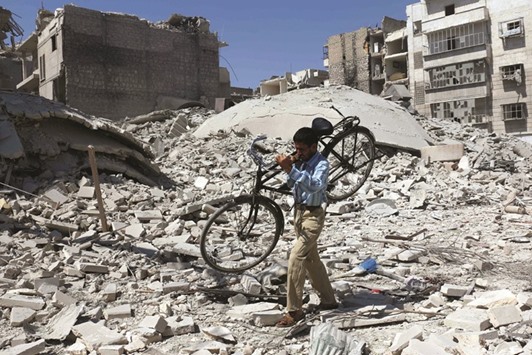Air strikes on Syria’s battleground city of Aleppo killed six civilians yesterday just 24 hours before a truce brokered by Russia and the United States was due to begin.
The ceasefire, announced after marathon talks by the Russian and US foreign ministers, has been billed as the best chance yet to end Syria’s five-year civil war estimated to have killed more than 290,000 people.
As the clock ticked towards sunset today when the ceasefire is expected to start, rebels battling the Syrian regime and the political opposition were still weighing whether to take part in the truce.
Key regime ally Iran welcomed the plan yesterday and called for “comprehensive monitoring” of the truce, particularly along Syria’s volatile borders.
But even as world powers threw their support behind the deal, regime air raids on rebel-held parts of northern city Aleppo killed six civilians and wounded 30, the Syrian Observatory for Human Rights said.
The latest bloodshed comes a day after air raids by unidentified warplanes hit two key northern cities in opposition-held territory.
At least 62 people, including 13 women and 13 children, were killed in Saturday’s bombardment of Idlib city, the Britain-based Observatory said.
The strikes hit several areas including a market full of shoppers preparing for the holiday of Eid al-Adha, which begins today.
Britain’s special representative for Syria, Gareth Bayley, called the attacks “barbaric”.
“Bring on the #SyriaCeasefire,” he tweeted yesterday.
Aleppo was hit for the second day yesterday, the Observatory said, after 12 civilians were killed there in air strikes on Saturday.
“We hope there will be a ceasefire so that civilians can get a break. The shelling goes on night and day, there are targeted killings, besieged cities,” said Abu Abdullah, who lives in Aleppo’s rebel-held east.
“Civilians have no hope anymore.”
In a major blow to the opposition, pro-regime forces reimposed a devastating siege on Aleppo’s eastern districts last week.
State news agency SANA reported on Saturday that Syrian President Bashar al-Assad’s government “approved the agreement” for a truce.
Lebanese Shia militia Hezbollah, which has intervened militarily on behalf of Assad, also announced its support.
Iran, a key backer of Assad and Hezbollah, also welcomed the truce deal, foreign ministry spokesman Bahram Ghasemi said.
But he cautioned that its success relies on creating “a comprehensive monitoring mechanism, in particular control of borders in order to stop the dispatch of fresh terrorists” to Syria.
Syria’s main opposition group the High Negotiations Committee — grouping political dissidents as well as armed rebel factions — had yet to formally respond.
Leading rebel figure Mohamed Alloush said yesterday the agreement was “still being studied”.
HNC member Bassma Kodmani said on Saturday that her group “cautiously welcomed” the deal but was sceptical that Damascus would comply.
Ahmad Saoud, head of the US-backed Division 13 rebel group, wrote on Twitter he was “starting to feel that the truce is a military trap to kill us even more”.
And hardline Islamist group Ahrar al-Sham, which works closely with former Al Qaeda affiliate Fateh al-Sham Front, said yesterday it was “still discussing the points of the truce”.
In battered east Aleppo, residents were split on whether this latest deal would hold any better than a February ceasefire that was repeatedly violated.
“We are praying for a ceasefire but the people don’t have much hope,” said Abu Abdullah.
Safwan Badawi said: “The Syrian people — whether in areas controlled by the regime or the opposition — have lost faith in both sides.”
In the capital Damascus, resident Taher Ibrahim said he did not expect any lasting respite.
“Nobody among the Syrian population accepts this agreement...(the opposition) are all the same and none of them will commit to this truce,” he said.
But in rebel-held Douma, besieged by government forces since 2013, the local council said it backed the truce and appealed for peace, stressing “enough of war”.

A Syrian man carrying a bicycle makes his way through the rubble of destroyed buildings following a reported air strike on the rebel-held Salihin neighbourhood of the northern city of Aleppo, yesterday. Air strikes have killed dozens in rebel-held parts of Syria as the opposition considers whether to join a US-Russia truce deal due to take effect today.
